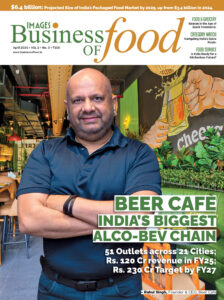India’s retail sector is undergoing a significant transformation due to the rapid adoption of advanced technologies. From traditional markets to modern online platforms, retail in India is being reshaped by innovations such as Artificial Intelligence (AI), the Internet of Things (IoT), and data analytics. These technologies are not only enhancing operational efficiency but also revolutionizing customer experiences, making shopping more personalized and seamless.
The Brain Behind Smart Retail
Artificial intelligence (AI) is driving a transformation in the retail industry. AI-powered tools are helping retailers predict consumer behaviour, efficiently manage inventory and provide personalized recommendations. According to the Deloitte–RAI report, AI has evolved from being just a tool to becoming the foundation for profitable growth in India’s consumer retail business. By 2025, it is estimated that 20% of the top global retailers will utilize distributed AI systems to revolutionize sales, marketing, supply chains, and operations. Additionally, AI-driven chatbots offer instant customer support, improving the shopping experience by offering real-time assistance and personalized product suggestions.
Connecting the Dots
The Internet of Things (IoT) is another game-changer in India’s retail sector. IoT devices, such as smart shelves and RFID tags, are streamlining inventory management and reducing losses due to theft or misplacement. These devices provide real-time data on stock levels, allowing retailers to automate reordering processes and maintain optimal inventory levels. Moreover, IoT-enabled smart mirrors and fitting rooms are enhancing the in-store experience by enabling customers to virtually try on clothes and accessories, making shopping more interactive and enjoyable. The Deloitte–RAI report highlights that nearly 92% of consumers are excited to try or have already tried interactive in-store displays.
Turning Data into Insights
Data analytics is the backbone of modern retail strategies. By analyzing customer data, retailers can gain deep insights into shopping patterns, preferences, and trends. This information is invaluable for creating targeted marketing campaigns, optimizing product placements, and improving customer loyalty programs. For example, data analytics can help retailers identify which products are frequently bought together, enabling them to create effective cross-selling strategies. Furthermore, predictive analytics can forecast future trends, helping retailers stay ahead of the competition. As consumer interactions increasingly shift online, data is creating radical differentiation between legacy retailers and digital-first brands.
Smart Retail, Seamless Service
Technology is revolutionizing retail operations by enhancing customer experiences. Automated checkout systems powered by AI and IoT are reducing wait times and improving the shopping experience. Advanced supply chain management systems ensure seamless product movement, reducing costs and improving efficiency. These technologies are enabling faster delivery times and better customer service, setting new industry standards. Personalized marketing, IoT devices, and AI-driven customer support are making shopping more convenient, enjoyable, and tailored to individual preferences. The Deloitte-RAI report indicates that 71% of consumers expect tailored experiences, signaling a shift towards experiential engagement beyond transactions.
Future-Fuelled Retail
The Boston Consulting Group (BCG) and the Indian Institute of Management Bangalore (IIMB) have highlighted the transformative impact of technology on India’s retail sector. BCG emphasizes the importance of digital transformation in creating a seamless omnichannel experience for customers, while IIMB highlights the critical role of technology in driving efficiency and innovation.
Advanced technologies like AI, IoT, and data analytics are driving significant changes, optimizing operations, and enhancing customer experiences. As these technologies continue to evolve, the future of retail in India looks promising, with endless possibilities for growth and innovation. Retailers who embrace these advancements will stay competitive and set new industry benchmarks, creating a vibrant and dynamic retail ecosystem.




